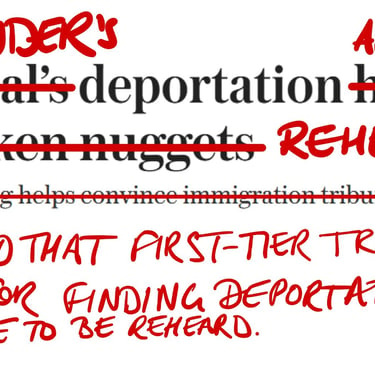The Secretary Of State for the Home Department v Klevis Disha (UI-2024-004546)
CORRECTING THE NARRATIVE
Amoleek A. Kaur
10/5/20253 min read


The Telegraph reported on the 9th February 2025 the following: “Albanian criminal’s deportation halted over son’s distaste for chicken nuggets”. This article is a gross mischaracterisation of the judgement and the legal principles involved in this Upper Tribunal Appeal.
This case concerned the deportation of the Albanian individual known as Klevis Disha, who entered the UK as an unaccompanied minor in 2001 and claimed asylum for political persecution under a false identity (namely that he falsely claimed to be from the former Yugoslavia and provided a false name). In 2017, he was convicted of possessing criminal property (valued at €300,000) and was imprisoned. Consequently, Mr Disha was deprived of his citizenship in 2021, under the finding that it was obtained by deception and a deportation order followed shortly after.
He appealed this deportation order under section 82 of the Nationality, Immigration and Asylum Act 2002, on human rights grounds, namely of his right to respect for family life (Article 8). He argued that deportation would have an ‘unduly harsh’ impact on his British partner (A) and their two children (B and C), particularly C, who has special educational needs.
The First-Tier Tribunal found that deportation would not be unduly harsh on A or B but would be unduly harsh on C due to his emotional and educational needs. The appeal was therefore allowed under section 117C(5) of the Nationality, Immigration and Asylum Act 2002, which protects against deportation if it would cause ‘undue harshness’ to a qualifying child.
The Secretary of State for the Home Department appealed this decision to the Upper Tribunal on the grounds that the Judge made a material error in law. It was argued that the First-Tier Tribunal Judge failed to give adequate reasons or sound evidential basis for the finding of ‘undue harshness’, specifically as there was no there was no formal diagnosis of C’s condition, no evidence about the availability of equivalent support in Albania and the evidence provided by the trainee psychologist report and parents statements was insufficient to make this finding.
The Upper Tribunal found in favour of the Secretary of State for the Home Department. As per HA (Iraq) [2022] UKSC 22, it was noted that the assessment of ‘unduly harsh’ had a high threshold, which was not met in the present case. It was found that the First-Tier Tribunal gave excessive weight to the report of a trainee psychologist without verifying her qualifications, that there was no professional assessment of how deportation or relocation to Albania would affect C, nor any comparison of available support services, and that the anecdotal evidence provided by the parents fell short of demonstrating ‘undue harshness’. It was concluded that the case would be reheard to address the issue.
The reporting by The Telegraph is said to be notably inaccurate and sensationalist.
The Telegraph claimed that the deportation of Mr Disha was ‘halted’. In the present case, the Tribunal found in favour of the Home Office. It set aside Mr Disha’s appeal and had the case sent back for rehearing. Under section 78 of the Nationality, Immigration and Asylum Act 2002, Mr Disha cannot be removed or made to leave the country before the conclusion of these proceedings. This does not ‘halt’ the deportation but rather reflects normal due process under the law. Such language seems to pander to right-wing anti-immigration ideologists and inaccurately represents what happened in this matter.
The Telegraph claimed that the deportation was halted due to Mr Disha’s 'son’s distaste for chicken nuggets'. The facts of this case turned on the legal test for ‘undue harshness’, not anecdotal stories about a child’s taste in food. The detail pertaining to chicken nuggets came from C’s parents’ testimonies relating to his special needs, namely the child’s sensitivity to foods, and how the child would not like foreign chicken nuggets should they move to Albania. While the First-Tier Tribunal did accept the parents’ evidence, alongside the trainee psychologist’s report as part of a broader account of the child’s difficulties, the Upper Tribunal expressly found that this evidence did not meet the legal threshold for “undue harshness” and that the case should be reheard on proper evidential grounds.
Such reporting undermines public understanding of the legal framework governing deportation and human rights appeals, using exaggerated anecdotal details as clickbait to provoke outrage and reinforce anti-immigration sentiment.
Veritas Vincit.
Truth Prevails.
Contact Us
veritasvincit.lp@gmail.com
© 2025. All rights reserved.
